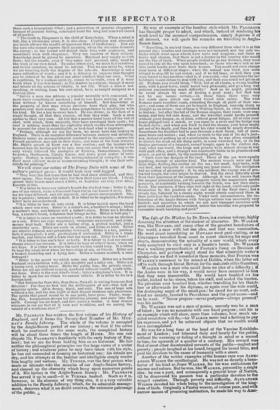Mr. PALGRAVE has written the first volume of his History
of England, and it forms the Twenty-first Number of Mr. MUR- RAY'S Family Library. The whole of the volume is occupied by the Anglo-Saxon period of our history ; so that if the entire work be continued on the same scale, the completed history will be about three times the length of HUME. No one can dispute Mr. PALGRAVE'S familiarity with the early history of Eng- land; but we are far from holding him as an historian. He has neither the philosophical principles nor the large views of n writer of history ; and whatever pains he may have taken with his style, he has not succeeded in forming an historical one: his details are dry, and his attempts at the familiar and intelligible simply render him lengthy and verbose. Mr. TURNER, was the first person who made us intimate with the minutiae of our Anglo-Saxon history, and cleared up the obscurity which hung upon numerous points of it. His history is the Anglo-Saxon library : Mr. PALGRAVE has served it up in small—it is TURNER hashed. Such as it is, however, in the absence of any thing else, it is a very valuable addition to the Family Library; which, for its admirable manage- ment, deserves what it no doubt receives, the extensive patronage of the public.. ,a; By way of example of the familiar style which Mr. PALGRAVI has thought proper to adopt, and which, instead of rendering his work level to the meanest comprehension, simply deprives it of all interest, we will quote his remarks on travelling in Anglo. Saxon times.
" Travelling, in ancient times, was very different from what it is at the present day ; coaches and carriages were not invented, and the only ve- hicles which went upon wheels were carts and waggons ; and these so heavy and clumsy, that there is not a farmer in the country who would use the like of them. When people wished to go any distance, they were forced to ride all the way upon horseback ; so those who were sick or in- firm could hardly ever leave their houses. You could not even change your horse at different stages : when the animal was tired, you were obliged to stop till he had rested ; and if he fell lame, or died, then you were forced to buy another—that is, if you could,—for sometimes the in- habitants would refuse to deal with you, and then you could not get on at all. Perhaps you would think, Well, but at all events, a strong healthy man, with a good horse, could travel very pleasantly, and go a long way without encountering much difficulty.' And so he might, provided he could always be sure of finding a good road ; but that was not by any means certain,—in those times there were very few roads upon which one could travel with safety. The wise Romans made excellent roads, extending through all parts of their em- pire ; and some of them can yet be traced in England, running along as straight as an arrow ; one of these is Watling Street, so often mentioned in history: but after the fall of the Roman empire, their roads were neg. lected, and they fell into decay, and the traveller could hardly proceed without great danger, or, at least, without great fatigue. All at once your horse plunged into a marsh, or you came to a river and the bridge was broken down ; and when you tried to ford the stream, your horse might get out of his depth, and then he and his rider would be nearly drowned. Sometimes the traveller had to pass through a dark forest, full of rave. nous bears and wolves ; and, when he came to the end of his day's jour- ney, instead of putting up at a comfortable inn, he was often compelled to stretch his cloak on the damp earth, in some wretched hut, or on the broken pavement of a haunted, ruined temple, open to the starless sky. And, what was worst, the kings and princes were almost always at war with each other, and a stranger was constantly liable to be plundered and seized, or put to death, by the contending parties. " Such were the dangers of the land. Those of the sea were equally appalling, though of another kind. The ancient vessels were not fine large ships, floating like castles on the sea ; but small, frail barks, with one deck, and incapable of containing any great stores. The navigators had no notion of geography : if, by any accident, the voyage was of pro- tracted length, the crew might be starved. But the chief difficulty arose from their ignorance of the compass. Although it was well known that the magnet attracted iron, yet the property which the magnetized needle possesses, of constantly turning towards the North, was not then disco- vered. The mariners, if they once lost sight of the coast, could only guide themselves by the position of the sun and of the fixed stars ; and a cloudy day, followed by a cloudy night, would utterly confound them in their path over the trackless ocean. Under such circumstances, the in.. tercourse of the Anglo-Saxons with foreign nations was necessarily very limited ; and countries to which we can now transport ourselves with great ease, could not then be visited, unless the traveller was prepared to encounter much hardship and peril."



























 Previous page
Previous page